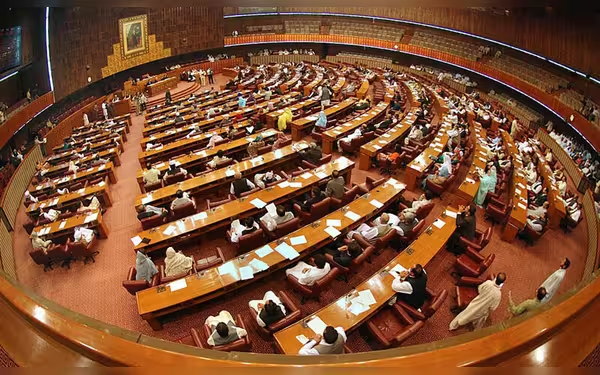Friday, October 4, 2024 06:29 AM
Supreme Court Review of Article 63-A Verdict Sparks Legal Debate
- Supreme Court allows counting of dissenting votes under Article 63-A.
- Legal experts express mixed reactions to the ruling's timing.
- Concerns raised over judicial independence and constitutional amendments.
 Image Credits: dawn
Image Credits: dawnThe Supreme Court's review of Article 63-A has ignited a debate among legal experts regarding its implications and timing.
The Supreme Court of Pakistan has recently made headlines by unanimously accepting a review petition concerning its 2022 verdict on the defection clause under Article 63-A of the Constitution. This clause is crucial as it governs how lawmakers can vote in relation to their political parties. The original ruling had stated that votes cast against party lines in specific situations should not be counted. However, the latest decision allows these votes to be counted, which could significantly impact future legislation.
In its 2022 ruling, the Supreme Court had identified four key instances where votes would not be counted if they contradicted party lines. These instances include the election of the Prime Minister and Chief Minister, votes of confidence or no-confidence, constitutional amendment bills, and money bills. The recent ruling, delivered by Chief Justice of Pakistan Qazi Faez Isa, is seen as a potential lifeline for the government, enabling it to gather the necessary support for constitutional amendments, many of which are related to the judiciary.
Legal experts have expressed mixed reactions to this development. Barrister Asad Rahim Khan noted that many in the legal community had disagreed with the original 2022 opinion, arguing that the Constitution does not explicitly prohibit counting votes from dissenting legislators. However, he raised concerns about the timing of the review petition, which came shortly after a failed constitutional amendment aimed at altering the Supreme Court's powers. He also pointed out that the review bench was formed without Justice Munib Akhtar, despite the chief justice's previous statements that such petitions should be heard by the original verdict's author.
Lawyer Basil Nabi Malik described the decision as correct but cautioned that the timing could raise questions about its legitimacy. He emphasized that the original judgment had overstepped its bounds in interpreting Article 63-A, suggesting that the hurried formation of the bench and the decision itself might cast doubt on its validity.
Abdul Moiz Jaferii, another lawyer, criticized the 2022 decision as incorrect, arguing that it undermined lawmakers' ability to express dissatisfaction with their leaders. He expressed concern that the current ruling could facilitate the passage of constitutional amendments that threaten judicial independence. Jaferii also highlighted the unusual haste with which the hearings were conducted, noting that the judges seemed unaware of any pressure on parliamentarians.
On the other hand, Barrister Yasser Latif Hamdani praised the Supreme Court's unanimous decision as a necessary correction, asserting that the 2022 ruling was politically motivated and an overreach of judicial authority. He argued that the Constitution allows individual members to vote according to their conscience, and that the previous ruling was unconstitutional.
Former Attorney General Ashtar Ausaf expressed satisfaction with the ruling, stating that it reaffirmed the importance of democracy and dissent within the constitutional framework. He emphasized that the Supreme Court's earlier decision was a misstep in judicial history that has now been rectified.
However, not all legal experts were in agreement. Barrister Rida Hosain criticized the decision, claiming that established legal principles were disregarded. She raised concerns about the legality of the bench that rendered the order, particularly the removal of Justice Munib Akhtar without lawful authority. Hosain argued that such actions undermine the integrity of the judicial process.
The Supreme Court's recent ruling on Article 63-A has sparked a significant debate within the legal community. While many lawyers welcome the decision as a necessary correction, others question the timing and the manner in which the ruling was reached. This situation highlights the ongoing complexities within Pakistan's political and judicial landscape, where the balance of power and the interpretation of constitutional provisions remain contentious issues. As the implications of this ruling unfold, it will be crucial for lawmakers and legal experts alike to navigate these challenges with transparency and integrity.













